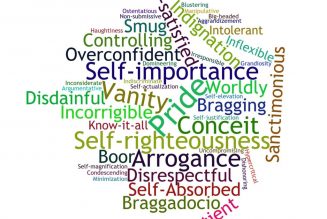In the first edition of A Good Man Is Hard to Find and Other Stories, Flannery O’Connor placed the following quote from St. Cyril of Jerusalem at the front of her book: “The dragon is by the side of the road, watching those who pass. Beware lest he devour you. We go to the father of souls, but it is necessary to pass by the dragon.” I encountered this dragon recently, online.
A few weeks ago, one of my Instagram followers informed me that someone had set up a new account impersonating me. This same person shared a screen shot of the fake account (I was unable to find it through my own search, as the imposter had blocked me), and I was shocked to see how authentic this phony account looked. The imposter copied my profile photo, my bio, many of my pictures, and had over three thousand followers. One would have to look very carefully to notice that there was an extra character added to the end of my name in this fraudulent account, otherwise, you would think it was me.
I notified Instagram of this imposter account through the app, and I asked my followers to beware of it, block it, and report it. But, as days passed, this phony account continued growing in followers and becoming more aggressive in following people who followed me. I received more direct messages from people informing me of the impersonator—this dragon by the side of the road. So I decided to file a formal report.
That evening, I was tired after hearing three hours of confessions, but I easily found the site for reporting imposter accounts to Instagram. I followed the instructions carefully to prove my identity and to expose this dragon as a fraud. I took a photo of myself holding my driver’s license in my hand and submitted it. It didn’t occur to me immediately, but later that night, I suddenly realized that I’d been duped. That website was an imposter too! I just sent a photo of myself holding my government-issued ID to a fake website. I felt sick. I felt violated. And I experienced deep embarrassment for being tricked so easily. Quickly, I called my credit card company, changed all my online passwords, and the next morning, after a terrible night of sleep, I ordered a security service to monitor my online accounts.
The devil cannot create, but he can distort what has been created.
Since then, I’ve thought a lot about people who make a living by deceiving others online. I’ve wondered about who took up that photo of me in my Roman collar, holding my driver’s license, and how it might be used in the future to scam other people—pretending to be a Catholic priest through direct messages, asking for money or gift cards, or maybe something worse to unsuspecting victims. I’ve considered the impressive amount of time, energy, creativity, and intelligence that it takes to create fraudulent online accounts and phony websites, and I can never wrap my mind around it all. And maybe that’s for the best. Evil is a mystery. It’s hard to understand.
The strange thing about scam artists, phony websites, and imposter Instagram accounts is that they reveal some important realities about our human condition. First, they disclose that we human beings are agents of truth. We desire to interact with reality, not just with appearances of reality. If we have a choice between what is authentic and what is counterfeit, we want what is real. The only reason that scams work is because they twist, distort, or imitate what is true. If they didn’t, we wouldn’t fall for them. Interestingly, sin works in the same way. The devil cannot create, but he can distort what has been created. The reason sin is attractive is because something about it looks good and true.
Second, scams show that we human beings tend to be generally trusting of our senses and of other human beings. By our nature, humans approach the world with a stance of belief, not doubt and suspicion. We are surprised and hurt when what we thought was true turns out to be false, and the surprise and hurt increase the more we know the trusted person or resource. Recall Psalm 55: “If this had been done by an enemy I could bear his taunts. If a rival had risen against me, I could hide from him. But it is you, my own companion, my intimate friend!”
Third, online scams reveal that human beings want to believe in the goodness of other human beings. Most of the online accounts impersonating priests today are created to ask faithful people for money or gift cards to help someone in need, and the reason people offer to help is because they desire to do good for the least of their brothers and sisters. The people who fall for these scams do so because they intend to act virtuously. They want to help their pastor or a priest they follow online help others. Scam artists take advantage of this benevolence of unsuspecting people.
Finally, scams remind us that we live in a fallen world. There are certainly more reminders that our world longs for redemption, but, when we get duped, somewhere deep down in our heart of hearts, we know that it shouldn’t be so. When we get scammed, we know the law of love has been violated. But, until we finally reach the father of souls, the danger is real.
Beware of that dragon.










